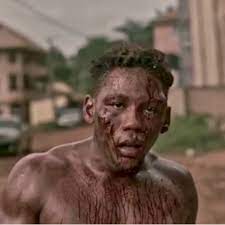By Seyi Lasisi
Film critic, Blessing Chinwendu Nwankwo, in her review of Dark October asked a question that doubles as the review title : “Dark October: Is October Cursed?” The title was inspired by two national tragedies: the Endsars Protest and the ALUU 4 killing — they both occurred in October, a decade apart. ALUU 4 inspired Dark October. Aside from sharing the same month, these events demonstrate Nigeria’s possible preference for killing its ambitious youth. Linda Ikeji’s debut filmmaking project, Dark October, which charts incidents before and after the ALUU 4 killing of four Nigerian youths, also passes as an advocacy against jungle justice. Chuks Joseph is one of the film’s leads.

Weeks after the release of trauma-concussing Dark October, Afrocritik’s film critic and journalist, Seyi Lasisi, spoke to Chuks Joseph about his craft, the media backlash Dark October had been receiving following its release, and what to expect in his next feature, Afamefuna.
Seyi Lasisi: For the benefit of a first-time audience, could you please tell us a bit more about yourself?
Chuks Joseph: My name is Chuks Joseph. I’m an actor, a model and a host. I am from Abia state, and I live in Lagos.

Lasisi: What were the primary motives for your current career path? At what point did being an actor become a vision to pursue?
Joseph: The primary motive was to chase a passion and dream I’d been nurturing for sometime; and it all started for me post COVID, 2020, after a modelling contest and I got the opportunity to get some training in acting.
Lasisi: What was your primary source of motivation as an actor? What films or filmmakers do you occasionally go to for “inspiration”? Do these include any of the Nollywood classics?
Joseph: My motivation was seeing young actors like myself on MTV’s Shuga, how I could live through different characters, and how I could play and tell stories through the art. One of my biggest film influences is Wolf of Wall Street, and Dope, a 2017 YA film about Bitcoins — I always imagined myself playing Jordan Beecroft. A Nollywood film will be ‘76 and The Figurine.
Lasisi: You studied Microbiology, and aside from being an actor, you triple as a model and host. How were you able to transition into filmmaking from these?’
Joseph: It wasn’t a walk in the park given my educational background, but I had the drive. My passion for acting fuelled my very early stages transitioning. I was also fortunate to go through some acting courses which shaped my skills and helped me grow.
Lasisi: You graduated from Ebony life Creative Academy in 2021. Within two years, you have created an admirable portfolio for yourself by featuring in YouTube and TV series (Leaked, After School Hours, Hotel Wahala) and now you have landed a role as the lead Dark October. What are the lessons you learned in this period as a budding actor in Nollywood?
Joseph: Always believe in yourself and never give up on yourself even when the NOs keep coming. Having quality friends whom you’d grow with and just staying focused on your path and being yourself without compromise.

Lasisi: On your Twitter bio, there is a quote: “roses don’t come without thorns.” Is this statement a subtle hint at your acting career — on how tedious the journey has been? And were your family members or friends supportive of you being an actor?
Joseph: It’s a general life statement because most great things don’t come too easily, and my life and career journey has had their fair share of ups and downs, challenges and triumphs. My family has always been supportive, although they weren’t sure how I’d be able to cope and transition given I had no prior experience whatsoever in filmmaking.
Lasisi: “4, October 2012,” for the Nigerian youth, is a tragic date. During the now-named ALUU 4 killing in Port-Harcourt, the subject matter of Dark October, where were you then? Describe your first-time emotion when the news broke.
Jo: I was about to enter my first year in University, and I was living in Aba, Abia state which is about an hour away from Port-Harcourt. It (the killing) felt close to home and so it advised me on the kind of life to live in school to stay safe. It was emotionally traumatising when the news broke. I wasn’t able to watch the clips online for a very long while before I finally summoned the courage to do so after some time.
Lasisi: There have been reports about a lack of clearance by the families of the victims about this production. What is your take on the media backlash so far?
Joseph: I wasn’t involved in the production of the film, so I have very limited knowledge about the whole clearance issue, but I clearly understand and respect the grievances of the family.
Lasisi: How did you land the lead role in Dark October? Were you approached by a casting agent for the lead role you played, or you got the role by auditioning? In any case, how did you feel about them?
Joseph: I wasn’t approached. I just saw the audition notice online and I attended the audition like every other person and got through two tough stages before getting cast for the role. It was almost unbelievable when I got the news, but I was very glad, elated and honoured to have played such an important character in the film.

Lasisi: Reflecting on the whole creative process of Dark October, from pre-production to the post-production stage, what was its most challenging aspect?
Joseph: I was not involved in pre production, except when we tried recording some songs for the film, which we did when production had already started. The long filming hours and the filming of the lynching sequence were very challenging and demanding.
Lasisi: On your part, what personal changes had to be made to fit in the character for this role, especially as the plot is heavily emotion-laden?
Joseph: I had to leave ‘Chuks’ asides and wore the character of Tizzy, and I made a lot of research on the story and the life of the guys who inspired the film. It was emotionally tasking to be the character especially when it came to the part of the lynching, but it helped me move to a deeper and higher level in my craft.
Lasisi: The South African industry has several films that were inspired by the country’s historical events. These films, though rife with tragedy, are revisiting these traumatic events as a sort of permanent documentation. Do you feel that as an industry, we should have more films that are adaptations of autobiographical events?
Joseph: Yes, we have a lot of Nigerian stories to tell, and I hope it gets done, so our stories can be out there for the world to know.
Lasisi: You have a film, Afamefuna, which has an unspecified release date. What should we be expecting to see? And asides Afamefuna, what other work are we expecting from you in the coming month(s)?
Joseph: Afamefuna is a different kind of production as it involved me speaking my indigenous language, Igbo, and it’s also a very important story that touches the Igbo apprenticeship system (Nwa-boy). Other projects to look forward to are The Origin, As We Age, and others I hope to get cast on with time.
Seyi Lasisi is a Nigerian student with an obsessive interest in Nigerian and African films as an art form. His film criticism aspires to engage the subtle and obvious politics, sentiments, and opinions of the filmmaker to see how it aligns with reality. He tweets @SeyiVortex.




